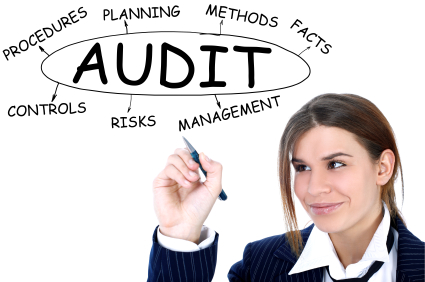- Canadian Bookkeeping Compliance Resource
- Tax Audits in Canada
Understanding Tax Audits in Canada
By L.Kenway BComm CPB Retired
Edited April 25, 2024 | Updated March 18, 2024 | Originally published on Bookkeeping-Essentials.com in 2011.
WHAT'S IN THIS ARTICLE
What it means to sign return | Audit triggers | Notice of Assessment | Tax review process | Tax audit process | Why you want to amend a tax return
NEXT IN SERIES >> CRA Audit Trails: Why You Want Them
Reduce your fear of tax audits by understanding the process. It is your responsibility to have knowledge of and apply the tax laws correctly, whether your return was prepared by a professional or not.
 Understand the audit process to reduce your fear
Understand the audit process to reduce your fearPieces Of The Puzzle Coming Together
HIGHLIGHTS OF THIS POST
Canada's tax system depends on self-assessment and self-reporting by taxpayers. The Canada Revenue Agency (CRA) conducts review activities to determine compliance.
- What it means when you sign your tax return
- What triggers tax audits in Canada
During reviews, CRA tries to educate you, the taxpayer, in addition to verifying your income reported. If you receive a request for documentation or receipts, it does not mean you are being audited.
- The difference between a review and an audit
- The pre-assessment review
- The notice of assessment
- The processing review
Business returns are often selected randomly based on computer generated lists of audit projects testing a particular group of tax payers identified as having high non-compliance.
- How returns are selected for a tax audit
- Office audit vs. field audit
- What happens in tax audits
- The notice of re-assessment
Good Compliance Habit
In Canada, we have a self assessing and self-reporting tax system. If you are caught evading tax, it is a criminal offense. Under tax law there is no presumption of innocence unless you are accused of tax evasion or some other criminal act; you are guilty until proven innocent in Tax Court.
Small business owners have a higher likelihood of getting audited than an employee because they have to remit their own source withholdings. Possible types of tax audits a small business owner may be subjected to are Office, Field, GST HST, or Payroll.
Your best defense is due diligence through accurate record keeping. Reduce your risk by developing good compliance habits.
Included in this article is a Good Compliance Habit Sidebar on Amending Your Tax Return to Avoid Penalties if you received some additional tax slips after you filed your return.

Help getting all your ducks in a row

- Can you write yourself a cheque or take cash from your business for personal use?
- Do I need to prepare a T4A Slip after hiring independent contractors?

What It Means When You Sign Your Income Tax Return
Once tax preparation is complete, your final step is to sign your income tax return. What does it mean when you put pen to paper? ... or hit the online send button?
You should know that when you sign your income tax return, or remit it electronically, you are stating that your return is correct and true. It is irrelevant who prepared your return - you, your spouse, a friend, a relative or a tax preparation professional.
When you sign the return you are accepting the burden that everything has been reported accurately and legally within the framework of tax law in Canada. There were two court cases in 2015 where this was put to the test.
- - - - - Sidebar - - - - -
Tax Law Design and Drafting chapter 2 explains "In general, the basic legal framework calls for taxation according to the rule of law. The fundamentals of this framework are that (1) a tax can be levied only if a statute lawfully enacted so provides, (2) a tax must be applied impartially, and (3) revenue raised by a tax can be used only for lawful public purposes, not for the prince's private ends . The rule of law contemplates that these principles will be enforced by independent courts."
- - - - - Sidebar - - - - -
It is your responsibility to have knowledge of and apply the tax laws correctly. Having a professionally prepared income tax return by a competent tax preparer helps ensures a return will stand up to a CRA audit. But even tax professionals make mistakes. Don't take a totally hands-off approach with the preparation of your tax return.

What triggers tax audits in Canada?
 The best way to avoid a tax audit is to take the time to get all your ducks in a row
The best way to avoid a tax audit is to take the time to get all your ducks in a rowBarrett Tax Law's article titled Twenty Tax Audit Triggers explains it very well ...
"Sometimes a taxpayer is randomly selected for an audit. ... But apart from a random tax audit, the odds of being targeted for an audit are dependent on a variety of risk factors. In short, the odds of being audited depends on who you are, where you are, what you do, what types of expenses you have, and so on. ... And the more risk factors a taxpayer has, the greater the odds of that taxpayer being audited."
The CRA database can compare your business data to others in the industry. Here are three issues that might trigger tax audits in Canada are:
- Unreasonable business expense deductions
- Underreported income
- Rounding numbers to the nearest hundred on your T2125
The best defence to reduce your risk of an audit is to develop the habit of getting organized by saving your supporting records and receipts. Get in the habit to document, document, did I mention document?

Tax Review Process
The Difference Between A CRA Review And CRA Audit
During reviews, CRA tries to educate you, the taxpayer, in addition to verifying your income reported. If you receive a request for documentation or receipts under the review process, it does not mean you are being audited.
Canada's tax system depends on self-assessment and self-reporting by taxpayers. Generally, there is a high degree of public compliance with the law. The Canada Revenue Agency (CRA) conducts review activities to determine compliance with Canadian tax law,
If you are being audited, you will receive a notice explaining you have been selected for an audit. Arrangements will be made for a meeting to begin the audit.

Tax Reviews - The Pre-Assessment Review
Once your return is filed, CRA does a pre-assessment review prior to issuing the Notice of Assessment. They do a quick check for arithmetic errors and check various deduction and credits on the return. No manual reviews are done at this point.
The peak period for doing this type of assessment is February to July. Once this review has been performed, a Notice of Assessment is issued. If you have a tax refund, it will be released at this time ... but be aware that if the more detailed reviews performed after the tax season determine there was an error, you may have to give some of that tax refund back ... so don't spend it too quickly.

The Notice of Assessment
The first document you will receive, usually about two to six weeks after you file your return, is your official Notice of Assessment. This is an important piece of paper. File it with your tax return. It has important information that will be required when you file next year's return.
If no problems have been found on the initial filing, the return will confirm your numbers.
If a problem was found, an explanation will be given and adjustments will be made by CRA to your return. You may have additional taxes, interest and penalties to pay.
You have whichever is the latest date of:
- one year from your tax filing due date, June 15 if you are self-employed; or
- 90 days after receiving the Notice of Assessment
to file a Notice of Objection if you disagree with the assessment. (If the numbers have been reassessed and you had a tax professional prepare your return, notify them immediately ... because sometimes CRA assessors do make mistakes.)
As a general rule, CRA can only change a return three years (statue of limitations) after the Notice of Assessment has been issued ... unless you are suspected of misrepresentation or fraud ... then there is no limit.
If numbers involve carry backs or investment tax credits, the limit is extended to six years.
Review this list of relevant tax compliance timelines. It is your responsibility to be aware of these time frames.

Tax Reviews - The Processing Review
After the tax season is over, between June and November, CRA conducts most of their processing reviews (which is similar to the pre-assessment reviews). It is a more thorough review of deductions and credits and may involve manual review.
Between September and March, the matching program is in full force.
This is when information filed is compared to third-party sources such as employers or financial institutions.
It's goal is to ensure the correct net income for tax purposes is reported ... as many of Canada's federal and provincial tax credits and benefits are dependent on this number.
It is important to note that if the CRA determines that a return under claims credits relating to CPP or at source tax deductions, an adjustment is made and if applicable, a refund is issued.
 Understanding Tax Audits in Canada
Understanding Tax Audits in Canada
Tax Audit Process
Office Audit (Tax Reviews) versus Field Audit (Tax Audits)
If you are selected for a tax audit in Canada, the tax auditor will perform an office audit or a field audit.
In an office audit, the auditor reviews your records at the CRA office. The majority of audits are office audits. You may not even meet with the auditor. Sending in the requested information to support your claim may be enough.
Office audits are part of the review process and CRA does not generally consider these true audits. They reserve that honor for the ... field audit.
During a field audit, the auditor comes to your place of business at a pre-arranged time. If you have an accountant representing you, the auditor will meet with your accountant at a pre-arranged time and place with the necessary support documents required.
Any unsupported claims will usually be denied. Storing your tax returns and supporting documents in one place each year will make a future audit proceed smoothly ... no running around trying to gather information ...
... soooo remember to put back any pieces of paper you remove from your bookkeeping box ... otherwise you undo all your audit proofing efforts. :O(
The better option these days is store your documents in the cloud using a document management system.

How Returns are Selected for a Tax Audit in Canada
In a Financial Post story on January 2, 2008 entitled Audits do not happen randomly, the commissioner and chief executive of CRA said during a talk to the Canadian Tax Foundation, that returns are selected for additional scrutiny because of a deduction claimed or an industry that is being focused on.
Based on the above three preliminary tax pre-audit reviews, your return may be selected for a more detailed tax audit. The selection process for individual returns may have a random selection process but are normally selected for the following reasons.
- for comparison to third party information
- missing information found under the matching program
- for certain types of deductions or credits claimed
- due to the individual's tax audit history ... you were audited previously and it resulted in an adjustment
Business returns are sorted and grouped by the CRA computer system ... then audit selection may be for one of the following reasons:
- random selection based on computer generated lists of audit projects testing a particular group of tax payers identified as having high non-compliance
- leads from information from other audits, investigations or informants
- association with other taxpayers who were selected for audit
No distinction is made based on the filing method nor on who prepared the return.

What Happens During Tax Audits in Canada?
What to expect from an audit
Check out the CRA Business Video Gallery for Webcasts on Tax Audits in Canada. They revise their webcasts so it may not be there ... but when I wrote this, their current series on Tax Audit is a three parter:
- Part One - What do we audit and what is a tax audit?
- Part Two - What are your responsibilities and what happens during an audit?
- Part Three - What are your rights?
The main purpose of the audit is to monitor and maintain the self-assessment system mentioned at the beginning of this discussion. Income tax audits in Canada used to be combined with a GST audit, but that practice stopped in 2010 when BC and Ontario introduced HST.
During tax audits in Canada, your ledgers, journal, bank documents, source documents such as sales invoices and expense receipts will be examined to ensure they support your claim. Vehicle logs will be perused. Issues will be identified and discussed. You may be requested to tape list receipts.
An audit is not a cause for concern ... unless you have engaged in tax avoidance or tax evasion.
You can have someone represent you in an audit. You do not have to meet the tax assessor alone.
Proposals will be made during the tax audit by the assessor. Always ask for these proposals to be put in writing. You will have 30 days to respond. Consideration will be given to your responses before the Reassessment Notice is issued.
Here's what you should do if you receive a notice saying you are being audited.

The Notice of Re-Assessment
Once you receive your re-assessment notice, arrange to pay any additional tax, interest and penalty charges. If you disagree with the notice ... you have 90 days from the date of the notice to file a Notice of Objection.
Tax audits in Canada have an appeal procedure. You can find great pictorial overviews of both the informal procedure and general procedure for notices of appeal on the Tax Court of Canada website. See what happens after filing the first document.
The Knowledge Bureau, a respected Canadian financial education institute since 2003, still have 2 excellent articles on their site about the 2 choices available to you if you want to object. I've updated the monetary limits in square brackets. The October 24, 2012 article looks at the formal tax court procedure while the November 4, 2012 article titled Sometimes it’s all about the proper procedure looks at the pros and cons of the informal procedure which is less costly and less time consuming. I still like these articles because they explain your options clearly and simply.
The October 24, 2012 article titled Tips From Tax Court: Procedures for Objecting Taxpayers very briefly provides an overview of both procedures. Here is an excerpt:
"The Informal Procedure is available only if the total disputed tax amount (other than interest or provincial tax) does not exceed $12,000 [$25,000 since 2013; $50,000 for GST disputes - before 2013 no limit], the amount of loss in issue does not exceed $24,000 [$50,000 since 2013], or the only amount disputed is interest ...
General Procedure is a formal litigation process that begins in the Tax Court of Canada and can proceed, if unresolved, through the Federal Court of Appeal right up to the Supreme Court of Canada. Going through this general court process is usually lengthy — there is no pre-determined time frame and can take several years — and very costly. It applies to disputes in which federal taxes exceed $12,000 [$25,000 since 2013; $50,000 for GST disputes - before 2013 no limit]."


Good Compliance Habit
Why You Want To Amend A Tax Return ... To Avoid Interest Penalties
 How NOT To Hand Over More Money To The Taxman Than Necessary
How NOT To Hand Over More Money To The Taxman Than NecessaryDid you make a mistake on a tax return you filed with CRA ... or get some more slips after you sent in your tax return?
If you receive additional T3, T4 or T5 income slips after you have filed your personal income tax return, you need to file an amendment with CRA using form T1ADJ - T1 Adjustment Request. Here's why.
One type of tax audit in Canada is the matching program. If the CRA finds unreported income during their matching program tax audits, your income tax return will be adjusted to reflect the missing T slips and a Notice of Reassessment will be mailed to you.
The first time this happens, you will be dinged for interest charges by CRA.
The second time this happens, a 10% penalty will be assessed on the unreported income under the federal Income Tax Act and an additional 10% penalty under the provincial Tax Act.
If you file an amendment before the matching program takes place, you will only be subject to the interest (if any) on the tax owing from the unreported income slips.
So save yourself some money and always file an amendment if you receive additional T slips after you have filed your return ... don't wait until next year.

Understanding Tax Audits in Canada
Reduce your fear of tax audits by understanding the process. It is your responsibility to have knowledge of and apply the tax laws correctly, whether your return was prepared by a professional or not.
In Canada, we have a self assessing and self-reporting tax system. If you are caught evading tax, it is a criminal offense. Under tax law (unlike criminal law), you are guilty until proven innocent.
Small business owners have a higher likelihood of getting audited than an employee because they have to remit their own source withholdings. Possible types of tax audits a small business owner may be subjected to are Office, Field, GST HST, or Payroll.
Audit proof books are your best defense.
- Canadian Bookkeeping Compliance Resource
- Tax Audits in Canada






